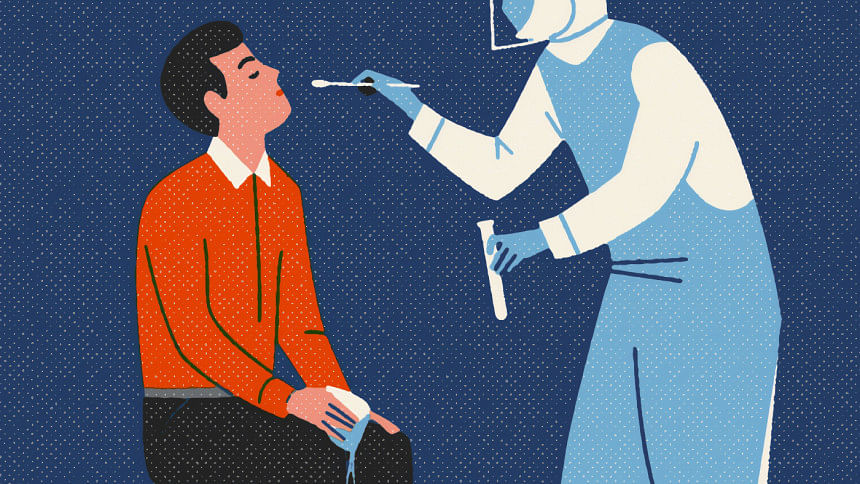The plight of female frontline workers during Covid-19

Female frontline workers are toiling a countless number of hours on duty since the Covid-19 outbreak. But being a female frontline warrior is just not about professional workloads. Many of them have endured physical and mental issues and faced social distress. We have talked with three of these frontline workers who have shared their challenges during this pandemic, especially from March to July when the quarantine restrictions and pressure were more severe.
"I was traumatised and felt helpless; the burden of death was too much"
Being a doctor is about both handling every patient carefully and confronting hard emotional issues. Dr Ritipurna Haimantika Dasgupta shared her story about what it meant to be a doctor during an outbreak.
There are multiple issues for her at the same time; shortage of PPEs, masks, gloves and other medical equipment, the reuse of the same PPE and urinary tract infection due to the long-term use of PPE, to name a few.
These issues were more severe at the peak of the pandemic. Ritipurna also mentioned how difficult it was for her to eat or drink at a regular interval while maintaining proper safety and how she has struggled a lot due to lack of transportation and felt insecure on roads at night as we are yet to make the roads safe for women.
Another challenging part was knowing the medical history of reluctant patients. While sharing the challenges, she also talked about the immense mental pressure and the feeling of helplessness when some of the patients died of Covid-19 despite their efforts and she even lost one of her colleagues.
"At first everything was difficult to maintain. Consecutive and nonstop duties for 10-12 hours with 2/3 masks along with N95 mask was really difficult. I also needed to ensure that my family didn't get affected by Covid-19 due to me. It's not easy to handle each of the issues at a time. But like every doctor, I'm also trying to cope up with the situation as it's becoming the new normal," said Dr Ritipurna.
"Don't sacrifice yourself for others, I was warned over and over"
Sarah Marandy, a development worker and director of Gram Bikash Kendra (GBK) in Parbatipur, Dinajpur has worked for the marginalised people amid this pandemic too.
However, she has often been mocked. Sarah was reminded again and again that she shouldn't take the risk as she has small kids. Some taunted her that none would come to bury her even if she died and her family would face challenges due to her. She shared how her female staff and she have been working under high risk and extreme mental pressure and trying to balance both personal and professional life since the beginning of the pandemic.

And reaching home safely with minimum facilities of transportation at night is like the second most important war to fight after the Covid-19 war for female frontline warriors.
As the director of GBK, she has faced complicated issues. There were no PPEs, masks and hand sanitisers in their Upazila during the initial period of Covid-19, and arranging these medical equipment for the social workers in a place where people had no idea about these types of equipment was a great challenge.
Sarah said, "I remember how all the people were looking at us strangely for wearing PPEs on the first day. But I felt like a warrior that day as I was doing something good for my people. Despite criticism and difficulties, we haven't stopped our work. Because there are many people outside who need us to have at least some food a day, and we'll do as much as we can".
"I had to wear a PPE for 12-hour straight, despite rashes and allergies"
Nurse Yeasmin Akhther, another female frontline worker has endured rashes and uneasiness due to constant wearing of PPE, masks and gloves on her 12-hour regular shift. Though the work shift is back to her normal shift hours, wearing the protective gowns and aprons is still a necessity.
She can't even take food or drink water whenever she needs as she doesn't want to waste the limited stock of protective equipment. Many time patients and their families behave aggressively with nurses and during this pandemic and according to her, these kind of people are on the rise.

Yeasmin recalled how a Covid-19 patient whom she was assisting, died due to the irresponsible behaviour of his family despite giving her best efforts.
"This incident is too small for a nurse who sees many patients dying in her career. But somehow I can't forget this incident as he was the first Covid-19 patient whom I was assisting. I tried my best to keep both of us protected, but he needed proper treatment of Covid-19 which was not available in our hospital or Upazilla at that time. But his family was reluctant to understand the depth of the pandemic and consequently, he died," said Yeasmin.
She also added, "Most people are ignorant to share their medical history. We, nurses, check the patients before assigning them to doctors, which add a great risk for us. With a greater risk and immense mental pressure, we're still doing our duty."

 For all latest news, follow The Daily Star's Google News channel.
For all latest news, follow The Daily Star's Google News channel. 




Comments